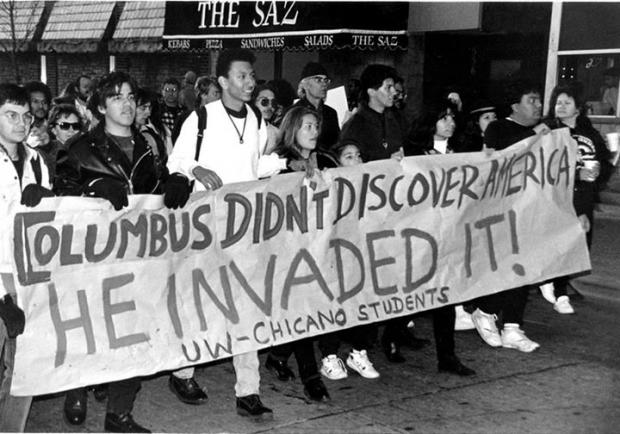GreenWatch: This Should be the Last Columbus Day
GreenWatch
Recently at least 8 US cities have eliminated the Columbus Day holiday from their celebrations and renamed the day “Indigenous People’s Day”. These cities include: Albuquerque, New Mexico; Lawrence, Kansas; Portland Oregon; Seattle, Washington; St. Paul, and Minneapolis, Minnesota; and Olympia, Washington.
These communities recognize that Columbus led a genocidal invasion of North America and that the people that were here first paid and continue to pay the price of genocide. Although some would argue that Columbus’s time was a different era, with different values, it is more than apparent that we in the 21st Century continue to evolve as a part of humanity and that it continues to be important to both recognize and address the cultural depredations of some of our ancestors.
Buffalo of course, played a pivotal role in the establishment of this holiday. Mariano A. Lucca, a long time west side resident who passed away in 1994, was one of the most outspoken and tireless advocates for the establishment of Columbus Day, which became a national holiday in 1971. He still has family here and is widely recognized in the Italian American community. I met him and knew members of his family. And yet, just as we need to move onward and rethink the 14th, 15th, and 16th centuries values of culture, we need to move on and live on this planet in the 21st century. 2015 has to be a time both of reconciliation and of a precedent setting commitment to human rights. This must become our overarching value, not just a commitment to “economic growth” as the singular value of our society.
This is true in our local community and across the globe. For instance as we move toward a Climate Agreement at the COP21 talks in Paris later this year, we need to listen to the indigenous people that are part of the Civil Society component of UN “negotiations”, and not just the corporate voices that rule the special “economic growth” interests that dominate the talks. Indigenous people continue to be targeted across the world. Have no doubt that the language and reality of the Paris COP21 agreements which promote economic development that continues to treat both ecology and social/cultural consequences as “externalities” have everything to do with ongoing genocidal actions. We are all in that target circle as the ultimate consequences of climate change and many of the false solutions that are on the table could end civilization as we know it within a few decades.
That said, the rights of the people that came here first must be prioritized. This is important as we think about this holiday in Buffalo New York. This includes “act local think global” as we need to embrace human rights across the globe, in North America as well as our own community. We are acting here-after a hot and emotional debate, Lancaster recently changed the Redskins High School sports team name to “Legends”. Last year our community renamed Squaw Island “Ga’nigo:i:yoh Island”, which means “Unity Island”. On a national scale, just last week California Governor Jerry Brown signed a law banning the name “Redskins” for schools in that state.
Simply put, it’s time that we abolish the concept of Columbus Day here, and adopt the concept of ”Indigenous People’s Day”. It is more than high time that we recognize the value of the people that were here first.
Note: Indigenous Day of Action, October 14, 2015
Interview with Kandi Mosset of the Indigenous Environmental Network on Sojourner Truth 7 October 2015
“The Doctrine of Discovery 500 Years of Injustice” by Steve Newcomb
The following article was first published on Columbus Day 2014 at GreenWatch News.
This Should Be the Last Columbus Day
by Jay Burney
When Howard Zinn wrote A People’s History of the United States, the first chapter was called “Columbus, the Indians, and Human Progress.” After he passed away in 2010, The Zinn Education Project was begun in order to promote and support the use of the book. Two non-profit organizations, Rethinking Schools and Teaching for Change, coordinate the project.
The project publishes the If We Knew Our History Series, featuring articles by teachers, journalists, and scholars “that highlight inadequacies in the history textbooks published by giant corporations.”
An article published last week (October 2014) by the project was written by Bill Bigelow, author and teacher. We are pleased to excerpt it and provide the full link below.
It’s Columbus Day…Time to Break the Silence
By Bill Bigelow, Zinn Education Project. October 3, 2014
This past January, almost exactly 20 years after its publication, Tucson schools banned the book I co-edited with Bob Peterson, Rethinking Columbus. It was one of a number of books adopted by Tucson’s celebrated Mexican American Studies program—a program long targeted by conservative Arizona politicians.
The school district sought to crush the Mexican American Studies program; our book itself was not the target, it just got caught in the crushing. Nonetheless, Tucson’s—and Arizona’s—attack on Mexican American Studies and Rethinking Columbus shares a common root: the attempt to silence stories that unsettle today’s unequal power arrangements.

